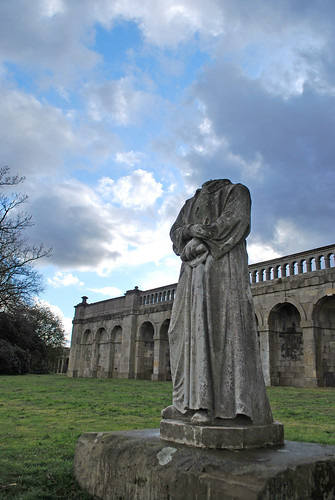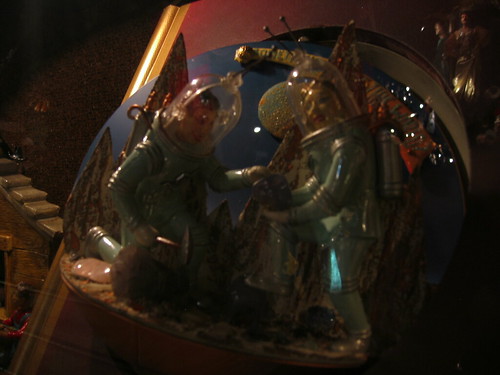 The other day
The other day, I mentioned that at the Brooklyn Book Festival I picked up some novellas published by
Melville House. One of them was
Dostoevsky's
The Eternal Husband (1870), which the flap copy describes thus:
This remarkably edgy and suspenseful tale shows that, despite being better known for his voluminous and sprawling novels, Fyodor Dostoevsky was a master of the more tightly focused form of the novella.
The Eternal Husband may, in fact, constitute his most classically shaped composition, with his most devilish plot: a man answers a late-night knock on the door to find himself in a tense and puzzling confrontation with the husband of a former lover--but it isn't clear if the husband knows about the affair. What follows is one of the most beautiful and piercing considerations ever written about the qualities of love: a dazzling psychological duel between the two men over knowledge they may or may not share, bringing them to a shattering conclusion.
They write good copy, those Melville House marketing people.
The copy got me to buy the book, and in addition, before I'd had a chance to start reading, it got me thinking about how other favorite authors would have handled this plot.
Graham Greene came immediately to mind. A Greene protagonist, confronted with the husband of a woman he's been sleeping with, would surely sit, his inherent guilt confirmed, and wait stolidly for the man to take a well-deserved swing at him. But if there turned out to be no blow--if the husband turned out to be ignorant after all--the Greene character would not take this close call as a sign that he should desist; rather, he would pursue the affair with ever more flagrant abandon, begging to be exposed and appropriately punished.
I imagine that a
Joseph Conrad hero's reaction would be fairly similar, but still distinct. Conrad's character would wait for the revelation that will confirm the knowledge he already carries of his failure. He knows he is guilty, but the guilt is not a religious guilt; rather, it is a personal one. He has failed to live up to his own deeply felt code. His only solace now is silence: he will endure any punishment (and consider it in some sense just) rather than confirm the husband's statements--and thereby betray the only confidence he has left, that of the wife. (Think "Long Black Veil.")
About
Anthony Powell, on the other hand, we don't have to speculate: in
The Kindly Ones, he presents us with a very similar situation, as Nick Jenkins finds himself having drinks with Bob Duport, ex-husband of Jean Templer, with whom Jenkins had brief, passionate affair at a time when she and Duport were vaguely separated. Duport is an impressively unpleasant man (Hilary Spurling, in her guide to
A Dance to the Music of Time,
Invitation to the Dance, calls him "aggressive and contradictuous."), but Jenkins rightly understands that
[W]hat I had done had made him, in some small degree, part of my own life. I was bound to him throughout eternity. Moreover, I was, for the same reason, in no position to be censorious. I had undermined my own critical standing.
What follows is one of the few moments in the novel sequence where Jenkins's own feelings come to the fore. So much of
Dance consists of Jenkins telling the reader about the activities of others, which he has watched from the wings while remaining relatively aloof; the Jean Templer episode affects Jenkins powerfully when it happens, and its repercussions, echoing ever so slightly throughout Jenkins's life, reawaken that power each time they surface.
In this case, Powell uses Duport to, in a sense, teach Nick a lesson, remind him that even those aspects of life that we think we know best--those people whose very hearts we think we've mapped--are full of mystery and surprise, often of an unpleasant nature. In the course of rather dispassionately relating his troubles with Jean over the years, Duport off-handedly reveals an affair that had been totally unknown to Jenkins, one that throws his own time with her into a new, stingingly cold light. It's a marvelously complicated scene, with all the power and surprise of real-life emotional reverses, and Nick Jenkins emerges from it as a more nuanced and interesting character--not just for the reader, but for himself as well.
All this is by way of thinking about how Dostoevsky would handle such a situation--and as I thought about it, I realized that I had no idea. Oh, I had some general guesses: Dostoevsky's characters tend to react to
everything in some sort of overwrought fashion--getting angry, drunk, guilty, passionately loving, violent. But part of what fascinates me about Dostoevsky is that I never have any real idea, in specific, how his characters are going to act. They're so utterly foreign to me, so singular, that they seem denizens of a world that is solely Dostoevsky's, bearing little relation to my own--like pinballs behaving according to laws of a physics that is totally different from ours, though no less immutable. In my own life I know Graham Greene characters, Joseph Conrad characters, and Anthony Powell characters--but no one knows Dostoevsky characters, right? (If you do, you're living a more dramatic life than I do, certainly.) No one can actually live with that intensity; that singularity is part of what makes them teem with life. They're utterly unpredictable, yet their actions, however overblown, manage somehow to seem right, even inevitable.
In that regard,
The Eternal Husband does not disappoint. The protagonist, Velchaninov, doesn't feel the slightest bit guilty about his position in relation to the husband, Pavel Pavlovitch--whom he characterizes as one of a type, "the eternal husband," a man who is destined to be a cuckold and who seeks out, unwittingly, a marriage in which he will be cuckolded (the very reason, again perhaps unwittingly, that the wife selects him)--yet he can't simply dismiss him, either. Instead, his Dostoveskian overwroughtness takes the form of obsession, a desire to know whether Pavel knows about the affair--and whether Pavel's young daughter, whom Pavel mostly disregards, might actually be Velchaninov's. That obsession also shades into paranoia, as Velchaninov has no idea what to make of Pavel Pavlovitch, who--in pure Dostoevsky fashion--is by turns lachrymose, manically exuberant, and vaguely accusing. His every statement of intent feels disingenuous--yet there is no way for Velchaninov to be sure, no way to know what Pavel wants from this renewed acquaintance. Unable to break with Pavel without knowing, Velchaninov finds himself in the role of advisor and friend--necessarily a false friend--accompanying him on an ill-fated courting expedition, all the while clueless about Pavel's knowledge and intentions. The tension is unremitting, and the resolution--surprisingly drawn-out and complicated--is frightening, oddly moving, and largely unexpected.
It's a reminder of why I return to Dostoevsky every year or two: even a second or third reading brings surprises and new insights. His vision of human life is almost wholly alien to me, but its intensity and honesty are undeniable and compelling. If
Tolstoy makes us larger, more empathetic, more human, Dostoevsky, for all his vexed faith, reminds us of our smallness and failures--and yet at the same time of our unbowed determination. As Pavel says,
One drinks the cup of one's sorrow till one is drunk with it.
Tolstoy would remind us to consider, as we empty our cups, the cups that others must drink; thus, together, he and Dostoevsky become twin stars, inseparable and indispensable.






